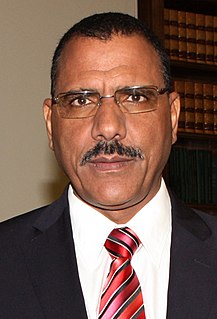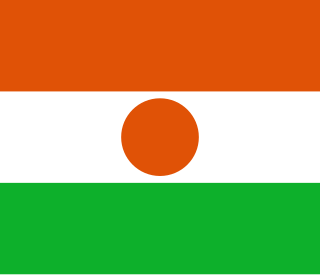
Politics of Niger takes place in a framework of a semi-presidential representative democratic republic, whereby the President of Niger is head of state and the Prime Minister of Niger head of government, and of a multi-party system. Executive power is exercised by the government. Legislative power is vested in both the government and the National Assembly.

The Nigerien Alliance for Democracy and Progress is a political party in Niger. Moumouni Adamou Djermakoye led the party from its foundation in 1992 until his death in 2009.

The Nigerien Party for Democracy and Socialism is a political party in Niger. It is a broadly left-wing party, part of the Socialist International, and since 2011 it has been in power following the election of its long-time leader, Mahamadou Issoufou, as President. Mohamed Bazoum is Acting President of the PNDS, and its Secretary-General is Foumakoye Gado.
Hamid Algabid is a Nigerien politician and the President of the Rally for Democracy and Progress (RDP-Jama'a) party. A lawyer, banker, and technocrat, Algabid was an important figure in the regime of Seyni Kountché, serving as Prime Minister of Niger from 1983 to 1988. He was Secretary-General of the Organisation of the Islamic Conference (OIC) from 1989 to 1996, and since 1997 he has been President of the RDP-Jama'a. He was also President of the High Council of Territorial Collectivities (HCCT) until 2010.
Amadou Boubacar Cissé is a Nigerien politician. He served as the Prime Minister of Niger on two occasions, from 8 to 21 February 1995 and again from 21 December 1996 to 27 November 1997. He has led a political party, the Union for Democracy and the Republic (UDR-Tabbat), since 1999, and he was appointed as Minister of State for Planning in 2011.
Amadou Cheiffou is a Nigerien politician who was Prime Minister of Niger from 26 October 1991 to 17 April 1993, heading a transitional government. He has led the Social Democratic Rally (RSD-Gaskiya), a political party, since founding it in January 2004. Cheiffou was President of the Economic, Social and Cultural Council of Niger (CESOC) from January 2006 to February 2010, and he held the official post of Ombudsman from August 2011 to December 2015.

Mohamed Bazoum is a Nigerien politician who has been President of the Nigerien Party for Democracy and Socialism (PNDS-Tarayya) since 2011. He served in the government of Niger as Minister of Foreign Affairs from 1995 to 1996 and again from 2011 to 2015. He was Minister of State at the Presidency from 2015 to 2016, and he has been Minister of State for the Interior since 2016.
Abdou Labo is a Nigerien politician and a member of the Democratic and Social Convention (CDS-Rahama). He briefly served in the government of Niger as Minister of Defense from 1994 to 1995, and under President Mamadou Tandja he held a succession of ministerial posts in the 2000s: he was Minister of Equipment from 2000 to 2002, Minister of State for Sports and Culture from 2002 to 2004, and Minister of State for Hydraulics from 2004 to 2007. Later, under President Mahamadou Issoufou, he served as Minister of State for the Interior from 2011 to 2013 and as Minister of State for Agriculture from 2013 to 2014.
Sanoussi Tambari Jackou is a Nigerien politician and the President of the Nigerien Party for Self-Management (PNA-Al'ouma). He was Vice-President of the National Assembly of Niger from 1993 to 1994 and served in the government as Minister of State for Higher Education, Research, Technology, and African Integration later in the 1990s. He was a Deputy in the National Assembly from 2004 to 2010.
Mohamed Abdoulahi is a Nigerien politician who served in the government of Niger as Minister of Mines and Energy from 2004 to 2010, under President Mamadou Tandja.
Issoufou Assoumane is a Nigerien politician who has been President of the Union of Nigerien Democrats and Socialists since 2001. He served in the government of Niger as Minister of Mines and Energy from 1995 to 1996 and as Minister of the Environment from 2000 to 2001.
Ousmane Issoufou Oubandawaki is a Nigerien politician. An engineer by profession, specializing in civil aviation, Oubandawaki held various posts at ASECNA and served in the government of Niger under President Ibrahim Baré Mainassara, first as Minister of National Defense from 1996 to 1997 and then as Minister of Transport from 1997 to 1998. He was Director-General of ASECNA from January 1999 to December 2004.
Issa Lamine is a Nigerien politician. He led the Toubou-based Front Democratique Revolutionnaire, one of several rebel groups operating in the far north and east of Niger in the late 1990s. Lamine entered government as a representative of the eastern town of N'Gourti in 2000. As a member of the Democratic and Social Convention (CDS-Rahama), he was a Deputy in the National Assembly of Niger and then served in the government of Niger as Minister of Public Health from 2007 to 2009. He left the CDS-Rahama in 2009 and was elected to the National Assembly as an independent candidate.
Moussa Moumouni Djermakoye was a Nigerien politician who was President of the Nigerien Alliance for Democracy and Progress, a political party in Niger, from 2010 to 2017. As a high-ranking army officer, he was Army Chief of Staff for a time and also briefly served as Minister of National Defense in 1999 as part of a transitional military regime. After retiring from the army and beginning a political career, he stood as the ANDP's candidate in the 2011 presidential election, winning only a small share of the vote. From December 2011 to 2017, he was President of the Economic, Social and Cultural Council of Niger (CESOC).
Ibrahim Yacouba, also known as Ibrahim Yacoubou, is a Nigerien politician who has served in the government of Niger as Minister of Foreign Affairs 2016 to 2018. He leads the Nigerien Patriotic Movement.








